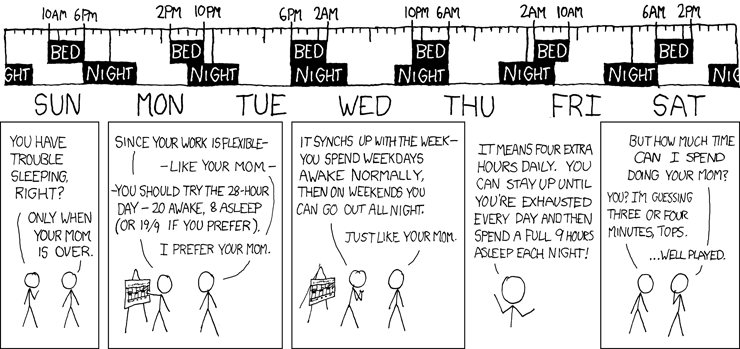I'm right now doing two part-time coaching gigs and that has proved tricky before. I've lost track of what I've been doing and where I was in my tasks. This time around I've managed to gain a bit more control through the use of two simple tools that helped me and my clients a lot.
The two gigs are quite different:
For my one-day-a-week-assignement we have a special setup that I think works very good for me and the client (so they say). I'm with them every Tuesday and we meet in their (excellent) coffee shop to discuss the day. We talked about what have happend since the last time I was there and usually they have some specific tasks for me to do under the day. For example:
I often have quite a lot of slack in my schedule there then goes around the floor and ask the teams how things are working out for them. Doesn't take to long before I get a lot of feedback from different people. I drink a LOT of coffee at this gig...
I end everyday by writing a email with a summation and my thoughts about what have happend during the day: "Marcus TuesdaysThoughts". Quite often I pretty much dump my journal from the day and add some more content to it. I put in about 35 minutes to write this email everyday.
It's proven very valuable both for me and for the client and has served as "food for thought" to the next Tuesday and where they could move next.
One-day-a-week-gigs is hard to get something out of, in my experience. It requires a lot of understanding and mutual agreement on what kind of level you will operate on. At this client I have got a great cooperation with the manager that hired me and he directs me to where he wants me to be during the day. You could say that he paves the way for my coaching during the day.
The two gigs are quite different:
- I'm working as an agile coach for Tradera and helping out in 4 different teams, as well as across the board on the organizational-level (yes, that Marcus going management right there - beware!:)). I work for Tradera 3 days a week.
- At Skandia (big Swedish insurance company) I'm acting agile coach in a non-agile environment and trying to helping them to flow stuff faster through their process. This gig is one day a week.
Which days? Scheduling
I've for many years now, done part-time gigs and one thing that I feel is important is to get the right kind of presence for the task you do.
For example - I've been part-time coder (don't ever do that - it's really hard to get it to work) and that often led to me having stuff going on that others waited for. For setups like that I would strive for consecutive days. So if I'm doing 3 days a week I would prefer to do Monday, Tuesday and Wednesday for the client. With that arrangement I can make sure that the work I'm doing is done by Wednesday and I don't take on more work than I can handle up to that day.
 |
| From XKCD http://xkcd.com/320/ |
Coaching is a bit different - here I'd much rather have my days spread out during the week, like every other day. As a coach I'd want to be around all the time, hear what's going on and have time to chat and talk with people as needed. Being around every other day gives that illusion in that I don't miss that much of the action, it's just a day ago.
The main point though is to be consistent: decided a setup ("I'm here Monday, Wednesdays and Fridays" for example) and stick to it. People that works full time at one place have a real hard time to remember arbitrary schedules, even if it's very natural for you. I know from experience on both ends: Elin, my wife, is a nurse and her schedule is pure witch-craft, i'm telling you.
Where do I sit?
Staffan Nöteberg is a great guy and one of my role models when it comes to coaching. He once said regarding a long agile-coaching assignment: "I worked around the coffee maker". That's really great advice.
 |
| http://rodarters.wordpress.com/2012/06/ 03/how-are-you-doing/ |
As a coach the best thing you can do is go around and ask people: "How are you doing? Got time for a coffee? Let's talk about it together".
I cannot count the number of times the best coaching I did was to put two people in a room and ask them a question that got them starting talk to each other. My job is to drink coffee.
I cannot count the number of times where I forget about this, sit down at my computer and start think for myself that I don't have something to do. Use the Joey-coaching technique... or not. But go around and check in on people. Joey is mostly checking people out as far as I understand.
The short answer to Where do I sit is - I try don't to sit that much, when I'm assigned as a coach. Therefore I often end up with no designated chair and table. That's just fine with me.
The short answer to Where do I sit is - I try don't to sit that much, when I'm assigned as a coach. Therefore I often end up with no designated chair and table. That's just fine with me.
Remembering what I did?
 |
| http://www.forteantimes.com/strangedays /mythbusters/706/forgetful_fish.html |
I have been equipped with the memory of a forgetful gold fish (yeah, that's a myth, sadly). For a long long time I have ignored that fact and just tried to remember things anyway. Failed of course.
For these last two assignments I've started to write a journal for my days at my clients. Just for me (but please see the next section too) to be able to remember where I was, what I did and how it went. Mostly I'm just jotting down a couple of lines per day. It can be stuff like:
- Met X and talked about agile values. Went well. He wants to spread the word
- Have to make sure that the teams start demoing more.
- Make sure they use their WIP-limits
Stuff like that. It's a great way for me to remember things that I otherwise would have forgotten.
I'm using the beautiful IA Writer to take my notes. It's simple and allows for some simple formatting by the markdown support. Any old text document would due. I also sync it to DropBox so that I then can forget my computer (yup - it has happend) and still be able to work.
Setup and follow-up
 |
| From http://www.walksofitaly.com/blog/ |
- Help Team X to get their board working
- Talk to the product owner and scrum master of team Y that doesn't have the same view on the backlog prioritization
- Introduce Lean for a group of stakeholders and explain why we are moving towards that.
I often have quite a lot of slack in my schedule there then goes around the floor and ask the teams how things are working out for them. Doesn't take to long before I get a lot of feedback from different people. I drink a LOT of coffee at this gig...
I end everyday by writing a email with a summation and my thoughts about what have happend during the day: "Marcus TuesdaysThoughts". Quite often I pretty much dump my journal from the day and add some more content to it. I put in about 35 minutes to write this email everyday.
It's proven very valuable both for me and for the client and has served as "food for thought" to the next Tuesday and where they could move next.
One-day-a-week-gigs is hard to get something out of, in my experience. It requires a lot of understanding and mutual agreement on what kind of level you will operate on. At this client I have got a great cooperation with the manager that hired me and he directs me to where he wants me to be during the day. You could say that he paves the way for my coaching during the day.
Conclusion
These simple practices has helped me a lot to get these coaching gigs to work, although I just put in a couple of days in each.
The most important learning though is to be very open and to the point with when and how much you will be with the client. It's then a dialog between you and them to get the most out of that time.
No comments:
Post a Comment